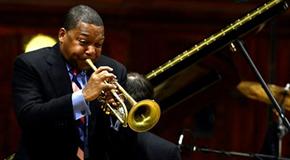
Daily Pulse
Get Pollstar News and more delivered right to your inbox with Pollstar Daily Pulse.
By signing up, you agree to Pollstar’s Privacy Policy and Terms of Use

Get Pollstar News and more delivered right to your inbox with Pollstar Daily Pulse.
By signing up, you agree to Pollstar’s Privacy Policy and Terms of Use

The tour of U.S. performing arts centers and churches involves a convoy of four buses and an equipment truck. The 15-piece orchestra and the 70-voice Chorale Le Chateau conducted by Damien Sneed are performing Marsalis’ “Abyssinian 200: A Celebration,” an extended work blending gospel and jazz traditions he wrote in 2008 to celebrate the 200th anniversary of Harlem’s Abyssinian Baptist Church.
“There’s never been a tour where a jazz band and a big choir like this went on the road and played a piece like this,” Marsalis said in a telephone interview. “It’s definitely a spiritual experience when you get the choir and the band and the congregation in there together.”
The piece, based on the liturgy used in many African-American Baptist churches, draws on diverse influences. These include the lessons Marsalis learned from his music professor father about traditional spirituals, hymns and gospel music, his own experiences as a classical trumpeter performing the religious works of Bach, Handel and Palestrina, and his vast knowledge of jazz styles going back to the music’s roots in his native New Orleans.
The 52-year-old Marsalis is complementing the tour that concludes this weekend with concerts at Jazz at Lincoln Center’s Rose Theater in New York and Boston’s Symphony Hall with the release this week of “The Spiritual Side of Wynton Marsalis.”
The album is a 15-track collection of spiritually inspired works that he recorded from 1988 to 2002. It includes selections from “In This House, On This Morning,” Marsalis’ first commissioned work for Jazz at Lincoln Center in 1992, capturing the feeling of a Sunday morning church service in the South.
The tour’s main sponsor is a foundation set up by a leading black businessman, David Steward, founder of World Wide Technology Inc. Steward described the concert series as “an excellent opportunity to celebrate and share the joy, cultural heritage and power of gospel and jazz with long-time fans and new listeners.”
Earlier this year, the orchestra made a U.S. tour playing a repertoire that covered its entire history. It performed everything from early New Orleans jazz to Ornette Coleman’s modern jazz as well as classic tunes by Duke Ellington, Thelonious Monk and Dave Brubeck, and compositions by contemporary jazz musicians, including several JLCO members.
“This is probably the most flexible ensemble ever in the history of jazz because we have to play so many different styles of music,” said Marsalis, JLCO’s music director.
Marsalis also hand-picked the 17-piece Jazz at Lincoln Center All-Stars to perform in the new Broadway show “After Midnight,” starring Fantasia and Dule Hill, which celebrates Duke Ellington’s years at the Cotton Club during the 1920s. Trombonist Art Baron says the band is using some of the same transcriptions of Ellington’s arrangements that he played as a founding member of the Lincoln Center Jazz Orchestra, as it was known when Marsalis formed it in 1988.
Baron, who played with Ellington before his death in 1974, said the Lincoln Center orchestra had “a very similar vibe … in which people were not judged by the color of your skin or by your age, just by the music you made.”
Marsalis formed the orchestra a year after Lincoln Center executive Alina Bloomgarden invited him to serve as artistic director for three August concerts at Alice Tully Hall. Marsalis couldn’t perform then because he was on tour, but those concerts planted the seed for Jazz at Lincoln Center, the largest cultural organization in the world devoted exclusively to jazz.
African-American scholar Albert Murray helped Marsalis understand the value of having an institution to support jazz whose mission would include putting on concerts and offering educational programs. Atlantic Records founder Ahmet Ertegun convinced him the organization needed its own orchestra to help preserve jazz’s large-ensemble tradition.
The original orchestra included members of Marsalis’ septet and surviving Ellington band alumni such as trombonist Britt Woodman and clarinetist Jimmy Hamilton, and at first played an almost exclusively Ellington repertoire.
The orchestra gradually expanded its scope by commissioning new arrangements and compositions from nearly 80 musicians, including Marsalis’ Pulitzer Prize-winning oratorio on slavery, “Blood on the Fields.” Its members are actively involved in JALC’s educational programs such as the Jazz For Young People concerts and Essentially Ellington High School Jazz Band Competition.
Over the years, the orchestra has traveled to more than three dozen countries on six continents – including tours of Russia, China and Cuba.
“We like being cultural ambassadors,” Marsalis said. “We present people with another view of our country that’s not mercenary … and have a perspective that’s shaped by the highest and noblest of our country’s ideology.”
Apart from Marsalis, 84-year-old baritone saxophonist Joe Temperley, a big band veteran, is the only holdover from the original lineup. The band’s youngest member, 30-year-old trombonist Chris Crenshaw, who joined in 2006, is among 10 current members who compose and arrange for the band. Crenshaw’s spiritually focused “God’s Trombones,” an extended work based on the poetry of preacher James Weldon Johnson, was premiered by JLCO in May.
“The orchestra has allowed me to do things that I didn’t see that I was capable of … It’s opened up doors for me not just in terms of playing but in composing, arranging and marketing,” Crenshaw said.
For Marsalis, the younger musicians are carrying the torch passed on by the orchestra’s original members.
“Many of our earlier members have passed away but the spirit that they left with us is still part of the band,” Marsalis said.
 Daily Pulse
Subscribe
Daily Pulse
Subscribe